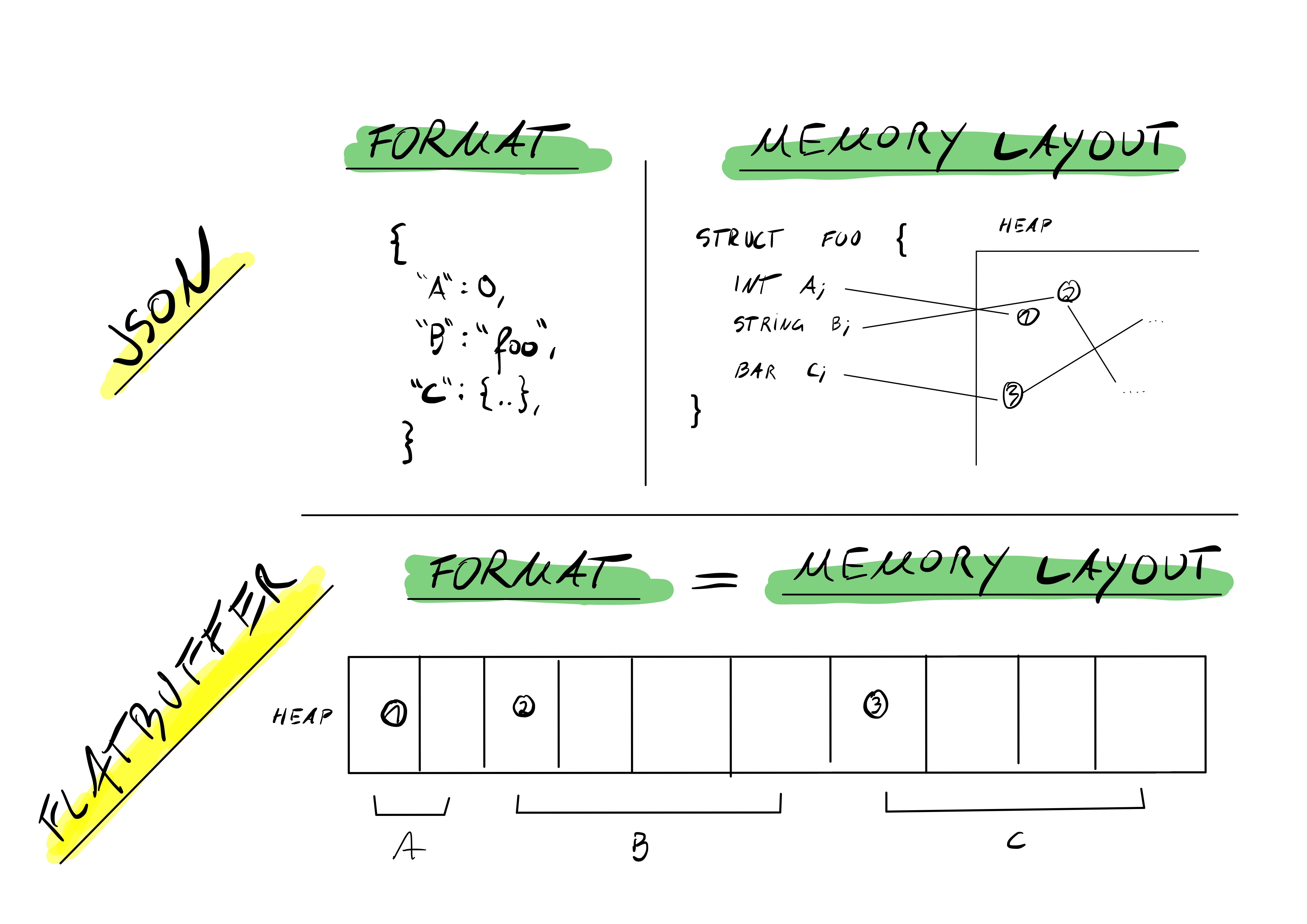Flatbuffers in Unity - a 40x gain
• gamedev, unity, programming, and rust
Problem
We recently switched from downloading and parsing JSON in our Unity client to a binary format based on Flatbuffers. In this this article you are going to learn:
- why we did that
- what Flatbuffers is anyway
- how you can do that yourself
- what benefit we gained
TL;DR
You are looking to simplify your life integrating Flatbuffers in Unity? Look no further: gameroasters/flatbuffers-unity
Context
Our recent game Wheelie Royale (Appstore / Playstore) downloads a lot of replay data by other players. Replay data was transmitted in JSON format. In the most extreme cases up to 15mb of JSON for a single level. While this is already a problem just because of mobile data usage it manifests even more severly in mid- to low-end devices when deserializing the JSON data.
After digging out my low-end test device (Galaxy S4) it took Newtonsoft.JSON 20 sec to deserialize the 15mb. This is bad and for some players it even went up to a minute - an absolute dealbreaker.
Obviously we had to find a better method entirely.
Flatbuffers
FlatBuffers is an efficient cross platform serialization library (Flatbuffers website)
Initially a Google internal project for game development it received some fame when Facebook announced massive performance gains by utilizing it on their mobile app (article).
Using Flatbuffers gives us two main advantages:
- Data is stored in binary form making it easy on the bandwidth
- Accessing Data is very fast since it is just a lookup from contiguous memory
The following graphic visualizes this:

Flatbuffers store data in a contiguous chunk of memory making it also easy on the garbage collector that especially in our use case was trashed with a lot of small allocations. If you mainly read your data from a buffer and do not need to alter it (our exact use case) it escentially reduces allocations to zero (reusing a static buffer).
Aside the compact memory layout Flatbuffers reduces the memory consumption by expecting both parties to know the schema. We later see how we generate code for client and backend to be able to speak the same language.
Comparison
- Before: Deserializing 15mb of Json in 20 secs
- After: Parsing the same data but using Flatbuffers (4mb) in 0,5 sec
This is a speed improvement of 40x.
Disclaimer: Of course this is not a proper scientific benchmarking method but it holds true even on our modern iPhones (albeit on a much smaller scale). I leave the more scientific methods of benchmarking to people smarter than me: benchmark
Flatbuffers Schema
Here is a simplified version of our schema file. Keep in mind that we are dealing with playbacks (ghosts) of other players. Each ghost consists of a TON of deltas (Sample) that allow us to replay them.
struct Sample {
//...
r: int16;
}
table GhostRecording {
//...
deltas: [Sample] (required);
}
table Ghost {
//...
recording: [GhostRecording] (required);
}
table Ghosts {
//...
items:[Ghost] (required);
}
root_type Ghosts;
Here you can see why our use case was particularly tough for the garbage collector in Unity since we are dealing with a lot of small individually allocated objects.
If you want to to more about the differences of table and struct you can find all details about the schema here: Flatbuffers Schema
Code generation
When it comes to the pipeline required to get this working I was disappointed at how little was available: no easy docker container to get flatc (the schema transpiler) working cross platform, no ready built .net library for Unity to get started.
So I built this and open sourced it on our company github: gameroasters/flatbuffers-unity
Using this docker container it is easy to create your serialization/deserialization code using the following snippet:
docker run -it -v $(shell pwd):/fb gameroasters/flatbuffers-unity:v1.12.0 /bin/bash -c "cd /fb && \
flatc -n --gen-onefile schema.fbs && \
flatc -r --gen-onefile schema.fbs"
This will mount your current working directory into the container, it is expecting to find a schema.fbs file in here and generate the necessary code for Rust and CSharp for you in two files called schema.rs and schema.cs.
Shortcomings
Flatbuffers is not going to make your code more readable. Here is an example how we read in our ghosts from it:
var fb_ghosts = GR.WR.Schema.Ghosts.GetRootAsGhosts(new ByteBuffer(data));
var res = new List<Ghost>(fb_ghosts.ItemsLength);
for (var i = 0; i < fb_ghosts.ItemsLength; i++)
{
var e = fb_ghosts.Items(i);
if (!e.HasValue) continue;
var recording = e.Value.Recording.Value;
var deltas = new List<Sample>(recording.DeltasLength);
for (var j = 0; j < recording.DeltasLength; j++)
{
var delta = recording.Deltas(j);
var r = delta.Value.R;
deltas.Add(new Sample(r));
}
var ghost = new Ghost();
ghost.recording = new GhostRecording();
ghost.recording.deltas = deltas;
res.Add(ghost);
}
Unlike some alternatives to Flatbuffers it does not create the Plain-Old-Data (POD) objects for you and deserialize into those. But that is by design. You could actually go without them when you only need to access it for reading.
We only create those to keep the code compatible with the previous approach that deserialized JSON into POD objects.
Alternatives
Of course there are alternatives that I do not want to hide:
Here is a very nice comparison matrix: https://capnproto.org/news/2014-06-17-capnproto-flatbuffers-sbe.html
The main benefit for protobuf is that it does the extra step of creating POD objects for you bringing it even closer to what you are used to in regular JSON deserialization. It is a good tradeoff between speed (Flatbuffers) and convenience (JSON). Another nice thing is: protobuf also speaks JSON which simplifies debugging a lot.
The other alternative - cap’n’proto - is actually made by the same guy who made protobuf and uses the same zero-allocation approach Flatbuffers uses. cap’n’proto does not support as many languages yet - thats the only reason I did not consider giving it a try (yet).
Ultimately there is no best solution, everything comes at a cost. If you need raw speed there is not much more you can get compared to Flatbuffers.